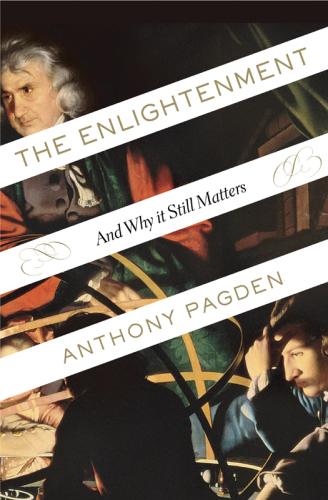
The Enlightenment
And Why It Still Matters
کتاب های مرتبط
- اطلاعات
- نقد و بررسی
- دیدگاه کاربران
نقد و بررسی

Starred review from April 22, 2013
For those who recognize the names Hegel, Hume, Rousseau, Kant, Voltaire, and Diderot but unfamiliar with their thought, Padgen (Peoples and Empires) provides a fantastic introduction; explaining the driving philosophies of the period and placing their proponents in context. In wry asides, he also offers snippets of their personal lives and interactions with each other. Padgen argues that the Reformation and the discovery of the Americas shattered certainty, causing many to reject the scholasticism of their upbringing. This led to a questioning of religion and the need for a secular state, with America as the beacon. Voltaire's friend, Benjamin Franklin, wanted to prove that, "a society of unbelievers could be just as moral as a society of the devout." Padgen also discusses the search for a "natural" culture and blueprints made for creating one in Europe. Through the popularity of Enlightenment treatises, concepts of equality and human rights were broached without recourse to religion. Some promoted the idea of a united Europe and a few brave men even espoused the equality of women, guardedly. Padgen's belief that the Enlightenment "made it possible for us to thinkâ¦beyond the narrow worlds into which we are born," is clearly and cogently presented. Agent: Andrew Wylie, The Wylie Agency.

Starred review from March 15, 2013
Pagden (Political Science and History/UCLA; Worlds at War: The 2,500-Year Struggle Between East and West, 2008, etc.) demonstrates the breadth and depth of his knowledge and his impeccable research of the period we refer to as the Enlightenment. Lest readers are daunted in trying to follow the deep thoughts of the great writers of the 18th century, the author gently explains each outlook, theory and proposal. This was the century of philosophy, but it was also the century when the science of man--i.e., social sciences--came into being. It was Gottfried Leibniz's "best of all possible worlds." Seeking to define men and their relationships with nature, and especially with each other, led to this scientific revolution; it was an intellectual process, a philosophical project and a social movement. The figures of the period were a combination of skeptics, epicureans and stoics seeking to build a cosmopolitan world of diverse people with common interests. Pagden impressively illustrates the significant discussions that took place as these scientists, historians and other intellectuals tried to fathom man's nature and subject dogma to reason. Many readers will wonder at what they would give to be present at Baron d'Holbach's Paris dinner table with Hume, Diderot, Rousseau, D'Alembert and even Ben Franklin as they discussed religion and a nature-centered universe. These storied men of letters dutifully studied the ages of man in his journey from the beginnings of agriculture to the right of property and division of lands. Pagden serves as a knowledgeable and enthusiastic guide through this "particular intellectual and cultural movement." A book that should be on every thinking person's shelf--the perfect primer for anyone interested in the development of Western civilization.
COPYRIGHT(2013) Kirkus Reviews, ALL RIGHTS RESERVED.

May 1, 2013
This is a defense by Pagden (political science & history, Univ. of California, Los Angeles; Worlds at War) of Enlightenment thought. Although John V. Fleming's The Dark Side of the Enlightenment is the more exploratory, Pagden's is the more conservative, but both books are based on their authors' long familiarity with the age. Against the age's critics, who argue that the philosophes' hyper-skepticism and materialism undermined authority and destroyed social cohesiveness, Pagden argues that the Enlightenment was not so much a revolutionary movement as a reformist one. Enlightenment thinkers preached a broader vision of humankind, opening the possibility for talk of universal human rights, and of such a modern-day extra-national community as the European Union. VERDICT This is top-down intellectual history--Greats talk to Greats--and the cast of characters is predictable, from Hobbes and Grotius to Montesquieu, Hume, and Kant. But Pagden knows what he's talking about and his argument is worth reading in our contentious age. Heavy going at times, this solid book is not for those seeking easy popular history. It will probably appeal most to serious lay readers of the subject.--David Keymer, Modesto, CA
Copyright 2013 Library Journal, LLC Used with permission.

April 15, 2013
Perhaps the most significant footnote in the entire history of Western thought, muses Padgen, appeared in a 1783 journal in Berlin. The footnote asked, What is enlightenment? Answering the question is this work's project, which Padgen conducts through eighteenth-century intellectuals associated with the Enlightenment. Unlike the philosophers and theologians of the preceding Renaissance and Reformation, who engaged in rediscovery or restoration of the past, Enlightenment thinkers repudiated traditions thought to fetter human beings. Religion, law, government, and social customs came under criticism from writers who varied in the subjects they contemplated but generally were animated by belief in the power of reason to define human nature and design human society. Partly a process of demolition, as in attacks on the claims of Christianity, and partly a process of construction, as in the beginnings of social sciences like economics, the course of the Enlightenment unfolds in Padgen's presentations of major figures Locke, Montesquieu, Voltaire, Rousseau, Hume, Adam Smith, and Kant. Readers interested in the origins of modernity, progressivism, and conservatism will find much to ponder in Padgen's substantive history of ideas.(Reprinted with permission of Booklist, copyright 2013, American Library Association.)

























دیدگاه کاربران